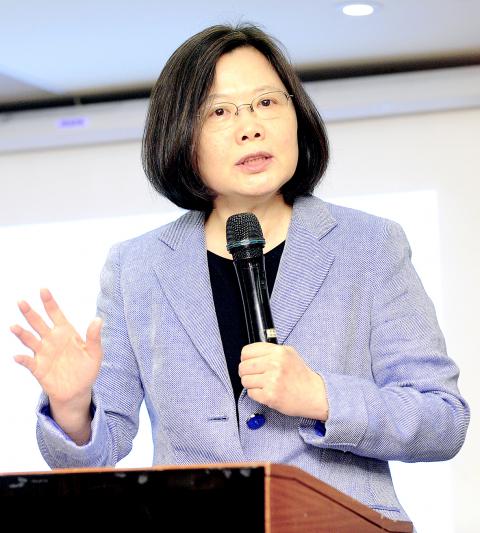Democratic Progressive Party (DPP) Chairperson Tsai Ing-wen (蔡英文) yesterday rejected a parallel drawn by President Ma Ying-jeou (馬英九) between her expectation of Taiwan as a “free island” (自由島) and the government’s free economic pilot zone policy.
Tsai made the rebuttal in a press release issued on Facebook yesterday, one day after Ma raised a question during the Chinese Nationalist Party’s (KMT) Central Standing Committee’s meeting on Wednesday about a speech Tsai gave at the Morgan Stanley Asia-Pacific Summit in Singapore in November last year.
In the speech, Tsai said Taiwan must position itself as a “free island” that boasts a liberalized economy, a diverse culture and a democratic political system, if it aspires to continue to play a key and constructive role in the Asia-Pacific region.

Photo: Chen Chih-chu, Taipei Times
“This part of the speech sounds fairly professional. People who are not aware of the identity of the speaker might even think she is some academic supportive of the government’s proposed free economic pilot zones project … since no one can really tell how [Tsai’s] goal is any different from the goal the government is endeavoring to achieve by setting up the pilot zones,” Ma said at the meeting.
The free economic pilot zone project aims to set up zones in Keelung Port, Suao Port in Yilan County, Taipei Port, Taichung Port, Anping Port in Greater Tainan, Kaohsiung Port, the Taoyuan Aerotropolis in Taoyuan County and the Pingtung Agricultural Biotechnology Park to serve as models for business convenience and liberalization.
Tsai, who has repeatedly taken issue with the project, criticizing it as an “empty policy,” yesterday said Ma had taken her words out of context.
“I clearly stated during my speech that the ‘free island’ initiative is built on three pillars: a liberalized economy, a diverse culture and a democratic political system, as there is no way Taiwan could ever maintain a strong foothold in the Asia-Pacific region if it only cares about trade liberalization,” she said.
The “free island” initiative seeks a balanced development of all the three pillars, while Ma’s oft-touted initiative of a “free economic island” only emphasizes economic development, she said.
“Our goals are on two totally different levels… Ma should have understood the main points of my speech before quoting me out of context,” Tsai said.
“He also should not have drawn a parallel between my initiative and his narrow-minded plan to try to gloss over the poor examples that have been set by the free economic pilot zone project,” Tsai added.
Meanwhile, National Taiwan University Hospital physician Ko Wen-je (柯文哲) — an independent aspirant for the Taipei mayoral election in November — was canvassing the streets around the Shuang Lian Traditional Market in Taipei’s Datong District (大同) yesterday morning.
The event was held hours before the DPP was due to conduct a public opinion poll last night on whether Ko or DPP Legislator Pasuya Yao (姚文智) would be a better pan-green camp candidate for the mayoral election.
The poll results are scheduled to be announced today.

Taiwan would welcome the return of Honduras as a diplomatic ally if its next president decides to make such a move, Minister of Foreign Affairs Lin Chia-lung (林佳龍) said yesterday. “Of course, we would welcome Honduras if they want to restore diplomatic ties with Taiwan after their elections,” Lin said at a meeting of the legislature’s Foreign Affairs and National Defense Committee, when asked to comment on statements made by two of the three Honduran presidential candidates during the presidential campaign in the Central American country. Taiwan is paying close attention to the region as a whole in the wake of a

President William Lai (賴清德) has appointed former vice president Chen Chien-jen (陳建仁) to attend the late Pope Francis’ funeral at the Vatican City on Saturday on his behalf, the Ministry of Foreign Affairs said today. The Holy See announced Francis’ funeral would take place on Saturday at 10am in St Peter’s Square. The ministry expressed condolences over Francis’ passing and said that Chen would represent Taiwan at the funeral and offer condolences in person. Taiwan and the Vatican have a long-standing and close diplomatic relationship, the ministry said. Both sides agreed to have Chen represent Taiwan at the funeral, given his Catholic identity and

Chinese Nationalist Party (KMT) Chairman Eric Chu (朱立倫), spokeswoman Yang Chih-yu (楊智伃) and Legislator Hsieh Lung-chieh (謝龍介) would be summoned by police for questioning for leading an illegal assembly on Thursday evening last week, Minister of the Interior Liu Shyh-fang (劉世芳) said today. The three KMT officials led an assembly outside the Taipei City Prosecutors’ Office, a restricted area where public assembly is not allowed, protesting the questioning of several KMT staff and searches of KMT headquarters and offices in a recall petition forgery case. Chu, Yang and Hsieh are all suspected of contravening the Assembly and Parade Act (集會遊行法) by holding

Lawmakers from the Democratic Progressive Party (DPP) yesterday established a friendship group with their counterparts in Ukraine to promote parliamentary exchanges between the two countries. A ceremony in Taipei for the Taiwan-Ukraine Parliamentary Friendship Association, initiated by DPP Legislator Chen Kuan-ting (陳冠廷), was attended by lawmakers and officials, including Deputy Minister of Foreign Affairs Francois Wu (吳志中) and European Economic and Trade Office in Taiwan Director Lutz Gullner. The increasingly dire situation in Ukraine is a global concern, and Taiwan cannot turn its back when the latter is in need of help, as the two countries share many common values and interests,